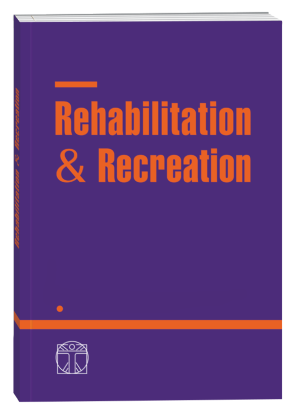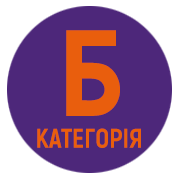PHYSICAL ACTIVITY AS AN ESSENTIAL ELEMENT IN THE PREVENTION AND TREATMENT OF THE METABOLIC SYNDROME
DOI:
https://doi.org/10.32782/2522-1795.2023.14.19Keywords:
physical activity, metabolic syndrome, healthy.Abstract
Physical activity is, apart from a balanced diet, the main element of a healthy lifestyle. Regularly practiced sport, adequate to age and health, has a beneficial effect on the functioning of the entire body. Physical activity protects the heart muscle, allows you to fight overweight and obesity, improves the functioning of the respiratory system, and has a positive effect on mental condition. The definition of metabolic syndrome is so simple that everyone is able to make the correct diagnosis after performing appropriate tests. In particular, overweight and obese people should be encouraged to conduct them, in whom the occasional blood pressure measurements exceed the values specified for the metabolic syndrome – and whose immediate family has diabetes, ischemic heart disease or a history of stroke. In order not to miss any of the elements of the "puzzle" of the metabolic syndrome, the most appropriate decision, in case of the slightest doubt, is to visit a general practitioner. According to a number of studies conducted in different populations, using different diagnostic criteria, metabolic syndrome was found in 20% of adult Poles and 4.2% to 9.6% of the population of children and adolescents. The occurrence of the metabolic syndrome is clearly associated with the presence of abdominal obesity. Such a high prevalence of this disorder is a major public health problem. Prevention of the metabolic syndrome at a young age includes proper nutrition, promotion of the Mediterranean-type nutrition model, and promotion of high physical activity. The introduction of these activities on a population scale requires extensive educational activities aimed at all population groups, especially parents, potential mothers, children and adolescents.
References
Alberti K.G.M.M, Robert H. Eckel, Scott M. Grundy, Paul Z. Zimmet, James I. Cleeman, Karen A. Donato, Jean-Charles Fruchart, W. Philip T. James, Catherine M. Loria, Sidney C. Smith. (2009). Harmonizing the Metabolic Syndrome, A Joint Interim Statement of the International Diabetes Federation Task Force on Epidemiology and Prevention; National Heart, Lung, and Blood Institute; American Heart Association; World Heart Federation; International Atherosclerosis Society; and International Association for the Study of Obesity.
Alberti KG, Zimmet P, Shaw J. (2006). Metabolic syndrome – a new world-wide definition. A Consensus Statement from the International Diabetes Federation.
Alberti KGMM, Aschner P., Assal J-P, Groop L., Jervell J., Kanazawa Y., Keen H., Klein R., Mbanya J-C., McCarty D., Motala A., Pan X-R., Ramachandran A., Samad N., Unwin N., Vardi P., Zimmet PZ. (1999). World Health Organization. Definition, Diagnosis and Classification of Diabetes Mellitus and Its Complications: Report of a WHO Consultation. Geneva.
Andrieieva O., Maltsev D., Kashuba V., Grygus I., Zaharina E., Vindyk A., Skalski D., Hutsman S. (2022). The Correlation between the Level of Health-Improving and Recreational Physical Activity and Family Well-Being. Physical Education Theory and Methodology, 22(3s), 94-101.
Brytek-Matera A. (2021). Psychodietetyka. PZWL.
Czarnecki D., Skalski D.W., Kowalski D., Vynogradskyi B., Grygus I. (2022). Aktywność fizyczna seniorów warunkiem zdrowia i dobrej jakości życia. Rehabilitation & recreation. 12. 105-112. https://doi.org/10.32782/2522-1795.2 022.12.15
Diachenko-Bohun M., Hrytsai N., Grynova M., Grygus I., Skaliy A., Hagner-Derengowska M., Napierała M., Muszkieta R., Zukow W. (2020). Historical Retrospective of the Development of Scientific Approaches to Health-Saving Activity in Society. International Journal of Applied Exercise Physiology, 9(1), 31-38. http://www.ijaep.com/index.php/IJAE/ article/view/692
Diachenko-Bohun M., Rybalko L., Grygus I., Zukow W. (2019). Health Preserving Educational Environment in the Condition for Information Technologies. Journal of History Culture and Art Research. 8(2), 93-101. doi:http://dx.doi. org/10.7596/taksad.v8i2.2075
Diachenko-Bohun, M., Hrytsai, N., Grynova, M., Grygus, I., Muszkieta, R., Napierała, M., Zukow, W. (2019). Characteristics of Healthbreakers in the Conditions of Realization of Health-Safety Technologies in Education Structures. International Journal of Applied Exercise Physiology, 8(3.1), 1-8.
Diachenko-Bohun, M., Hrytsai, N., Grynova, M., Grygus I., Zukow W. (2019). The readiness formation of future biology teachers for healthcare- safety technologies realization in professional activity. Education and Information Technologies. 24(1), 679-691. https://doi.org/10.1007/ s10639-018-9799-y
Drygas W., Bielecki W., Kozakiewicz K., Pająk A., Piotrowski W., Tykarski A., Wyrzykowski B., Zdrojewski T. (2015). Wieloośrodkowe Ogólnopolskie Badanie Stanu Zdrowia Ludności (WOBASZ II).
Gawęcki J., Grzymisławski M. (red.). (2012). Żywienie człowieka zdrowego i chorego. Wydawnictwo Naukowe PWN.
Grygus, I., Chovpylo, M., Ortenburger, D. (2018). Role of Physical Activity in the Process of Physical Rehabilitation of Pregnancy. Physical Education, Sports and Health Culture in Modern Society. (2(42), 102-110. https://doi.org/ 10.29038/2220-7481-2018-02-102-110
Gylling H. (2014). Plant sterols and plant stanols in the management of dyslipidemia and prevention of cardiovascular disease. Atherosclerosis. 232(2):346-60.
Hrytsai N., Trokhymchuk I., Diachenko- Bohun M., Grygus I., Muszkieta R., Napierała M., Hagner-Derengowska M., Ostrowska M., Smoleńska O., Zukow W. (2020). The Formation of System of Knowledge about Oncology Diseases and Their Prevention of Future Biologists. International Journal of Applied Exercise Physiology. 9 (4): 6-11. http://www.ijaep.com/index. php/IJAE/issue/view/30
Jarosz M., Rychlik E., Stoś K., Charzewska J. (red.). (2021). Normy żywienia dla populacji Polski i ich zastosowanie. Narodowy Instytut Zdrowia Publicznego – Państwowy Zakład Higieny.
Kalinowski P., Mianowana M. (2016). Zespół metaboliczny cz. II. Epidemiologia zespołu metabolicznego w Polsce i na świecie. Journal of Education, Health and Sport. 6(4):466-480. DOI:10.5281/zenodo.50681
Kramkowska M., Czyżewska K. (2014). Zespół metaboliczny – historia, definicje, kontrowersje. Zakład Biologii Chorób Cywilizacyjnych Katedry Chemii i Biochemii Klinicznej, Uniwersytet Medyczny im. Karola Marcinkowskiego w Poznaniu.
Lavrin G.Z., Sereda I.O., Kuczer T.V., Grygus I.M., Zukow W. (2019). The Results of Student’s Survey on Models of Physical Education in Universities and Motivations to Encourage for Active Participation in Physical Education. International Journal of Applied Exercise Physiology. VOL. 8 (2). 140-143.
Lewis A. Grossman. (2008). Food, Drugs, and Droods: A Historical Consideration of Definitions and Categories in American Food and Drug Law, 93 Cornell L. Rev. 1091.
Maltsev D., Andrieieva O., Kashuba V., Yarmak O., Dobrodub E., Grygus I., Prusik K. (2022). Assessment of the Quality of Active Family Leisure. Physical Education Theory and Methodology, 22(3), 386-392. https://doi. org/10.17309/tmfv.2022.3.13
Momot O., Diachenko-Bohun M., Hrytsai N., Grygus I., Stankiewicz B., Skaliy A., Hagner-Derengowska M., Napierala M., Muszkieta R., Ostrowska M., Zukow W. (2020). Creation of a Healthcare Environment at a Higher Educational Institution. Journal of Physical Education and Sport, Vol 20 (Supplement issue 2), 975–981.
Ostrowska (red.). (2018). Diagnostyka laboratoryjna w dietetyce. PZWL.169-171.
Pacholczyk M., Ferenc T., Kowalski J. (2008). The metabolic syndrome. Definitions and diagnostic criteria for its identification. Postepy Hig Med Dosw. 16;62:530-42.
Petruk L., Grygus I. (2019). The influence of physical exercises on physical development and physical preparedness of the first year female students. Sport i Turystyka. Środkowoeuropejskie Czasopismo Naukowe, 2, 3, 97–105.
Savliuk S., Kashuba V., Romanova V., Afanasiev S., Goncharova N., Grygus I., Gotowski R., Vypasniak I., Panchuk A. (2020). Implementation of the Algorithm for Corrective and Preventive Measures in the Process of Adaptive Physical Education of Pupils with Special Needs. Teorìâ Ta Metodika Fìzičnogo Vihovannâ, 20(1), 4-11. https://doi.org/10.17309/ tmfv.2020.1.01
Skalski D., Lizakowski P., Nesterchuk N., Grygus I. (2018). Klasowe i warstwowe uwarunkowania uczestnictwa w sporcie a edukacja zdrowotna. Rehabilitation & recreation. 3. 132-138.
Taraszewska A. (2021). Nadwaga i otyłość u dzieci i młodzieży. NCEŻ.
Włodarek D., Lange E., Kozłowska L., Głąbska D. (2015). Dietoterapia. Pzwl. 2575.
World Health Organization. 2016.
Zabolotna O., Skalski D., Formela M., Kowalski D., Nesterchuk N., Grygus I. (2019). Rodzina a kultura fizyczna. Socjologiczne aspekty rodziny w kontekście edukacji zdrowotnej. Rehabilitation & recreation. 4. 37-48.
Downloads
Published
How to Cite
Issue
Section
License

This work is licensed under a Creative Commons Attribution-NonCommercial-NoDerivatives 4.0 International License.











